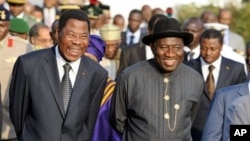The president of the Economic Community of West African States (ECOWAS) Commission has expressed concern about the violent clashes in the Ivorian commercial capital, Abidjan, between supporters of both President-elect Alassane Ouattara and embattled President Laurent Gbagbo.
Ambassador James Victor Gbeho says there is a need for the rival parties to stop the violence to allow ECOWAS, as well as the African Union (AU), to find a solution to end the ongoing political stalemate. Gbeho, who just returned to Nigeria after leading an ECOWAS delegation to Ivory Coast, also urged the rivals to, in his words, exercise caution.
“All sides regard this as an unfortunate development, although not surprising because, as time has passed, both sides have grown rather jittery, especially since they have been talking at each other in the immediate past. And so, I’m not surprised that we are beginning to see the beginning of fights,” said Gbeho.
“It has gone on all along. Perhaps the only difference is that, in frustration, one side is using heavy weapons in order to inflict maximum damage. That, and all types of fighting, must be stopped. The international community, especially the African Union and ECOWAS, are appealing to both sides to exercise restraint. The High-Level Panel of the African Union is working hard and we hope that, very soon, the whole thing will be sorted out.”
Gbagbo has imposed an overnight curfew in two Abidjan neighborhoods seen as Ouattara strongholds, the Abobo and Anyama districts for three consecutive days that began Monday. Sporadic fighting between both sides continued Monday in both neighborhoods for a sixth straight day.
Gbeho describes as regrettable the ongoing violence. He says the growing divisions among African leaders have slowed efforts of both the AU, as well as the ECOWAS, in resolving the ongoing political stalemate.
“There is no question about that, that it was the division that led to all this. You remember when ECOWAS first adopted its resolutions and issued them as communiqués that the whole of Africa was behind (them). But then, owing to the backtracking of a few countries, we lost a lot of time and created the space for the African Union to step in, and so it was, in a way, unavoidable,” said Gbeho.
“But, since the High-Level Panel started working, the unity of Africa has been restored. And, as you know, the African Union is working closely with ECOWAS to find a resolution of the conflict.”
Meanwhile, U.N. Secretary-General Ban Ki-moon accused Belarus of delivering three attack helicopters to Ivory Coast to help Gbagbo. In a statement issued late Sunday, Ban called the deliveries “a serious violation” of an arms embargo and vowed that “appropriate action will be taken.”
He also called for the Security Council to meet “urgently’ to discuss the issue. The Belarus Foreign Ministry rejects the claims saying it is in strict compliance with all Security Council resolutions.









